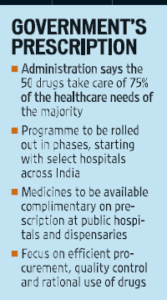The health ministry in trying to speed up the free generic drug programme which will ultimately aim to provide 348 drugs under the National List of Essential Medicines for free from 1.6 lakh sub-centres, 23,000 primary health centres, 5,000 community health centres and 640 district hospitals. According to this earlier article, the ministry in consultation with state governments is working out all logistical details with respect to procurement and distribution of free generic medicines in all government run health institutions across the country.
The Planning Commission had earlier estimated that the free generic drug programme would cost Rs 28,560 crore during the 12th plan period (2012-2017) .While the Centre would bear 75% of the cost, the states are supposed to contribute 25%. The National Rural Health Mission (NRHM) and National Urban Health Mission (NUHM) are to be used as vehicles for implementation of the free generic drug distribution programme.
Original comments on the scheme in 2012 said that the new programme was likely to benefit India’s strong generic pharmaceutical industry, but will be a a huge concern for multinational pharmaceuticals seeking to sell their medicines in the country. However, the research -driven pharma industry often highlights the importance of an effective generic market in providing low -cost access to out -of -patent medicines. Health budget holders can then afford more truly innovative medicines which have to be priced higher to recover some of the R&D costs
A question that the new government needs to urgently address is how it is going to tackle the poor health infrastructure across India, without which free drugs will not make much difference. Most government hospitals in India are overcrowded, understaffed and lack medicines and supplies. There are significant shortages in the number of doctors, nurses, paramedics and hospital beds and these pose a great challenge for speedier implementation of universal healthcare in the country.


